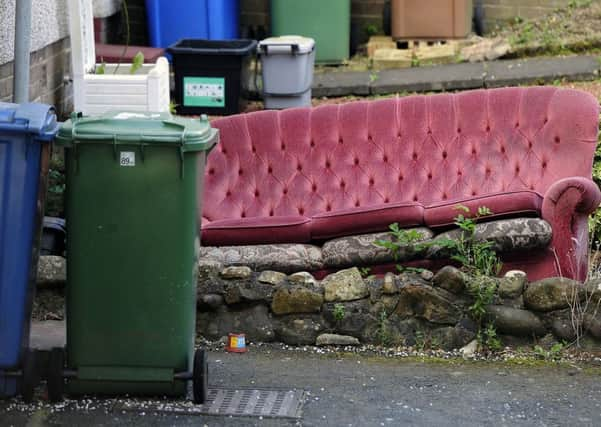Buteman bulky uplifts: Argyll and Bute has the highest first level cost for bulky waste uplifts in Scotland


With councils facing increasing pressure on their budgets, the majority of local authorities across the country have introduced additional charges for bulky waste collections – a service many once provided for free.
The BBC analysis reveals widespread regional variations across the UK in how much people are being asked to pay, with prices ranging from just a few pounds for a single item to more than £100 for collections of multiple items.
Advertisement
Hide AdAdvertisement
Hide AdIn Argyll and Bute, the council provides a bulky waste service to residents for a fee depending on the time it takes to uplift, picking up white goods and furniture. It costs locals £63.35 for a ten-minute collection, with an additional charge for extra time.
This first level charge is considerably higher than other local authorities across Scotland, with Stirling Council charging the next most at £42.10.
In other remote, island areas, Orkney Islands Council charges £15.83 for up to five items, but then jumps up to £66.50 for six items up, and £134 for a lorry load. Shetland Islands Council charges £30 for up to six items
Elsewhere, City of Edinburgh Council charges just £5 per item. East Ayrshire Council charges £15.54 for one to three items, £25.90 for four to five items and £3.10 per additional item – with a maximum of 10 additional items allowed per uplift.
A spokesperson for Argyll and Bute Council said: “The cost for our bulk uplift service covers staff, vehicle, fuel and the charges we have to pay for disposal. Year on year cuts mean that, like all councils, we must make changes so we meet our statutory duties and this means recovering our costs on some services. We would like to keep charges lower, but this is unfortunately not an option.
“There are other things you can do with unwanted household items. If they are in good enough condition to be reused, they can be donated and recycled. Details of local re-use organisations are available on our website: http://bit.ly/2CSO0uW.
“When buying new white goods, many suppliers will remove the old unwanted appliances for a small charge. This saves money and helps the environment.”
The average cost for a bulky waste collection is £6 in Scotland. Wales has the same average figure, while England’s average bulky waste uplift costs £11 and in Northern Ireland it is £2.
Advertisement
Hide AdAdvertisement
Hide AdDEFRA (Department for Environment, Food and Rural Affairs) said: “It is up to local authorities to set their priorities for the collection of waste and recycling on a local level – based on the needs of their local communities and within the national waste policy.
“Local authorities are able to charge what they see fit for the collection and disposal of ‘bulky waste’, but we expect them to consult on any charges with local residents.”
With councils facing increasing pressure on their budgets, the majority of local authorities across the country have introduced additional charges for bulky waste collections - a service many once provided for free.
Bulky waste is furniture, household electrical items like televisions and white goods including fridges and freezers - essentially all the things from your house you no longer need and can’t fit into a bin.
The BBC Shared Data Unit analysed statistics on bulky waste charges across England, Scotland, Wales and Northern Ireland, sourced from local authority websites between October and November 2018.
Most councils provide some form of bulky waste service, whether directly, through a partnership with a waste contractor, or working with local charities and social enterprises that specialise in recycling.
Professor Simin Davoudi, professor of environmental policy & planning, Newcastle University, said: “The charges could correlate with the cost of the service - it might be cheaper in the North East than in the South East. Then there is also the socio-economic profile of an area.
“For people in deprived communities paying £10 or £15 is quite a lot of money. The Local Government Association (LGA) did a survey and said there is no direct link between charging and fly-tipping.
Advertisement
Hide AdAdvertisement
Hide Ad“Charges for collecting bulky waste may not be the only factor in fly tipping but it is a factor. It seems to me that bulky waste charges are a bit of a false economy. The cost of clearing fly-tipping is much higher than the charge to collect.
“The figure for cleaning up fly-tipping in 2016/17 was nearly £60m. Next to that, the charges they have managed to collect are nothing.
“It needs proper investigation to see if it really is worthwhile to charge for collections rather than provide that extra incentive for people not to fly-tip.”
Rubbish collection is one of the most basic services provided by local councils - but not all household waste is covered by the cost of council tax, as demonstrated by the recent introduction of a charge for the collection of garden waste by councils across Scotland.